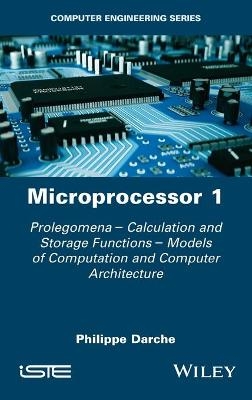
Microprocessor 1
ISTE Ltd and John Wiley & Sons Inc (Verlag)
978-1-78630-563-3 (ISBN)
Philippe Darche is Maître de conférences in Information Technology at the Institut Universitaire de Technologie (IUT) de Paris and a researcher at LIP6 at Sorbonne University in the Inria DeLyS (DistributEd aLgorithms and sYstemS) team, France. He is the author of five books in the field of computer architecture.
Quotation vii
Preface ix
Introduction xiii
Chapter 1. The Function of Computation 1
1.1. Beginnings 2
1.2. Classes of computers 10
1.3. Analog approach 36
1.4. Hardware–software relationship 37
1.5. Integration and its limits 43
1.6. Conclusion 47
Chapter 2. The Function of Memory 49
2.1. Definition 50
2.2. Related concepts 56
2.2.1. A story of endianness 56
2.2.2. Alignment 56
2.3. Modeling 57
2.4. Classification 59
2.5. Conclusion 61
Chapter 3. Computation Model and Architecture: Illustration with the von Neumann Approach 63
3.1. Basic concepts 64
3.1.1. The idea of a program 64
3.1.2. Control and data flows and mechanisms 65
3.1.3. Models of computation 67
3.1.4. Architectures 72
3.1.5. The semantic gap 80
3.2. The original von Neumann machine 81
3.2.1. von Neumann’s computation model 81
3.2.2. von Neumann’s (machine) architecture 82
3.2.3. Control 89
3.3. Modern von Neumann machines 90
3.3.1. Abstraction level 91
3.3.2. Base execution outline 97
3.3.3. Possible transfers 100
3.3.4. Summary: advantages and disadvantages of this model 102
3.4. Variations on a theme 104
3.4.1. Classification by bus 104
3.4.2. Harvard architectures 111
3.4.3. Parallelism 113
3.5. Instruction set architecture 117
3.5.1. Storage components 118
3.5.2. Data format and type 126
3.5.3. Instruction set 126
3.5.4. Memory model 127
3.5.5. Execution modes 128
3.5.6. Miscellaneous 128
3.6. Basic definitions for this book 128
3.7. Conclusion 129
Conclusion of Volume 1 131
Exercises 133
Acronyms 135
References 153
Index 173
| Erscheinungsdatum | 15.01.2021 |
|---|---|
| Verlagsort | London |
| Sprache | englisch |
| Maße | 10 x 10 mm |
| Gewicht | 454 g |
| Themenwelt | Technik ► Elektrotechnik / Energietechnik |
| Technik ► Nachrichtentechnik | |
| ISBN-10 | 1-78630-563-1 / 1786305631 |
| ISBN-13 | 978-1-78630-563-3 / 9781786305633 |
| Zustand | Neuware |
| Haben Sie eine Frage zum Produkt? |
aus dem Bereich


